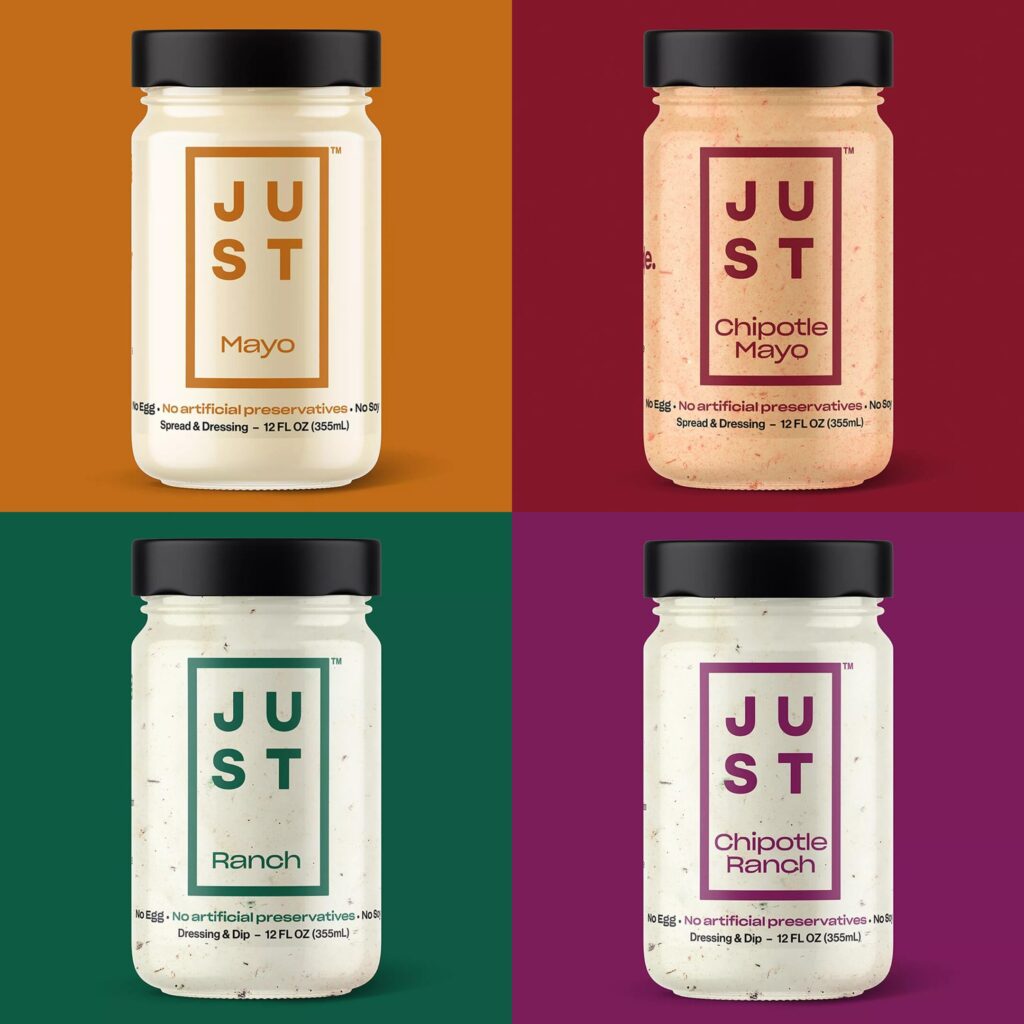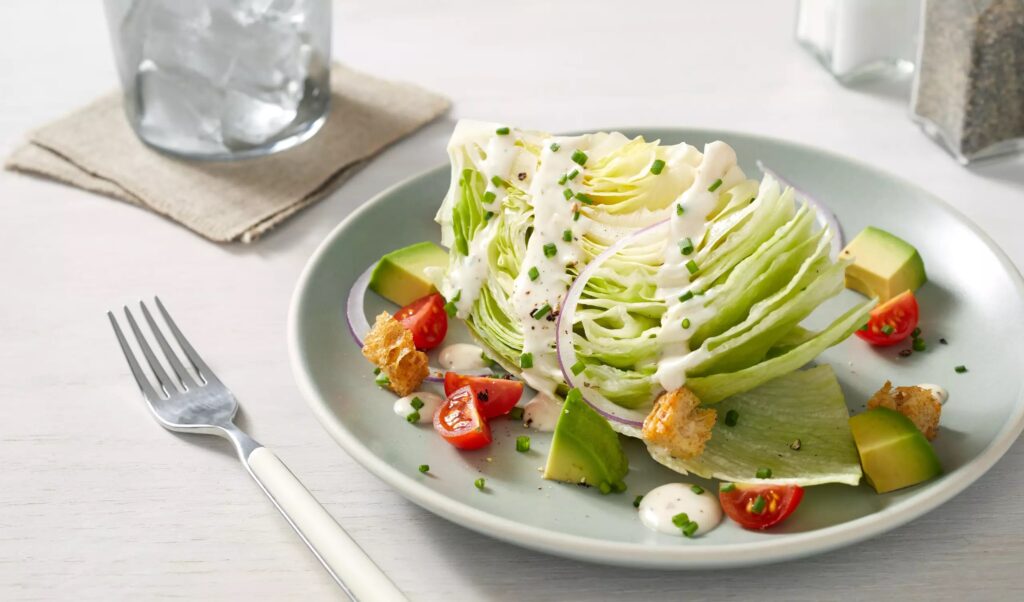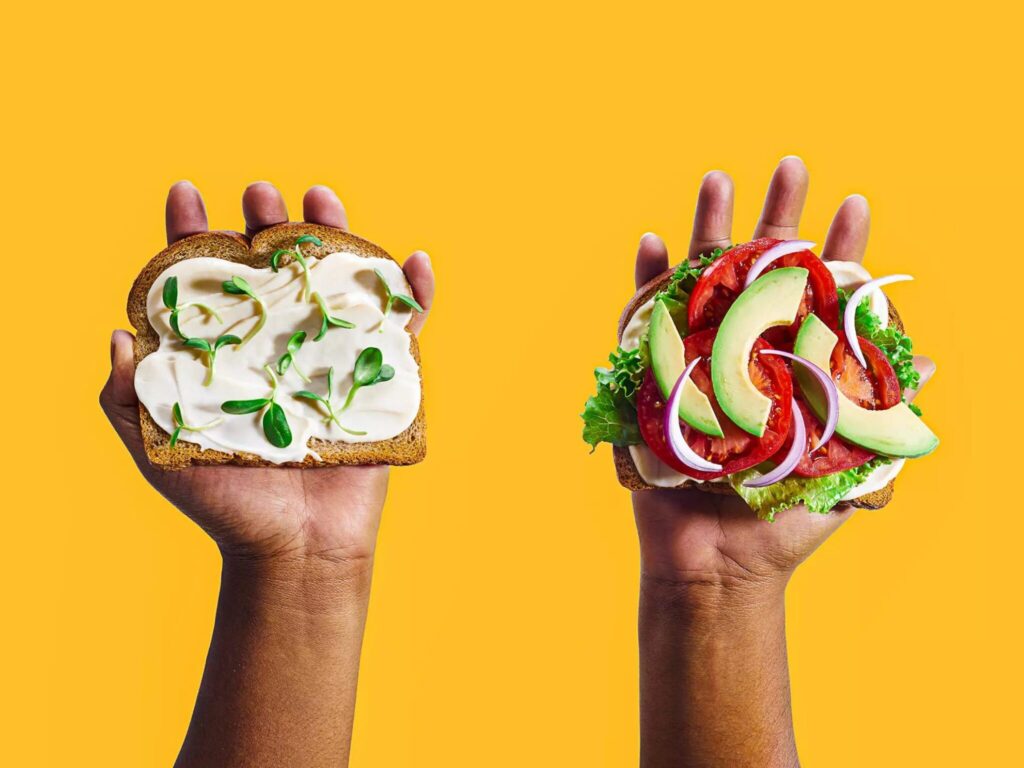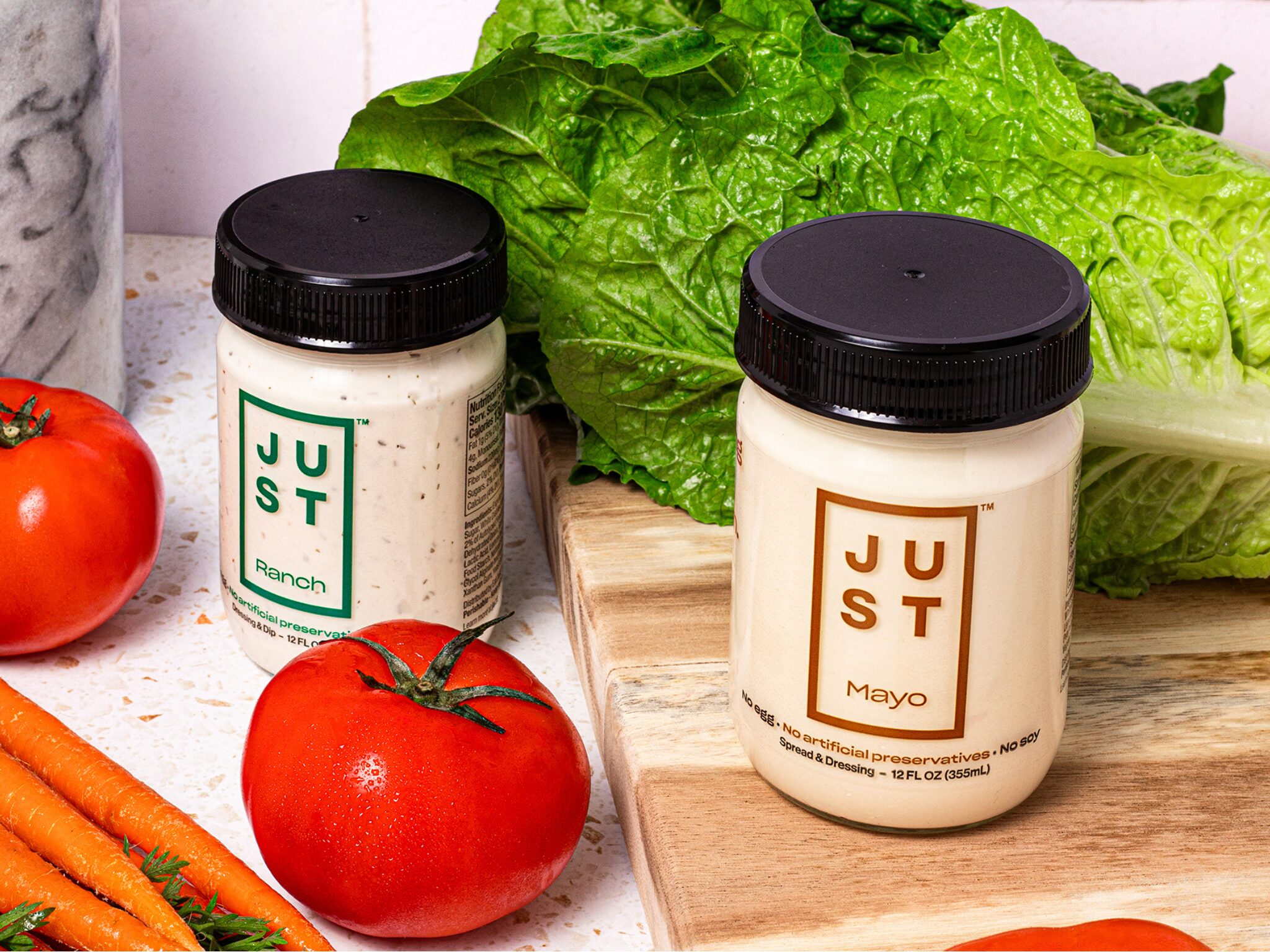‘A Religious Obsession’: Eat Just Responds to Consumer Demand by Bringing Back Vegan Mayo & Ranch
7 Mins Read
Eat Just has relaunched its vegan mayonnaise and ranch lines, citing years of requests from consumers to bring back the products. The return of the SKUs, which were discontinued after major controversy and to focus on the Just Egg rollout, will help the business reach its profitability goals.
Five years after discontinuing its ultra-popular (and controversial) condiments, Eat Just has responded to consumer’s wishes. The Just Mayo and Ranch ranges are returning to supermarket shelves, as the Californian company steps up its efforts to become profitable this year.
The relaunched dressings will be rolled out in the refrigerated section of Whole Foods stores nationwide from February, before entering the ambient aisles of additional retailers in March. Both products have been brought back in two flavours: original and chipotle.
In a tongue-in-cheek statement, Eat Just’s global marketing head, Tom Rossmeissl, said: “Who would have thought? People who had a religious obsession with our mayo and dressings would be pissed when we cut them? I thought I’d get a few angry emails. But instead, we’ve seen almost four years of pseudo-online bullying and boxes of hate mail.
“We just wanted people to scramble some plant eggs, but I guess we could have let them continue to slather their bread and pizza too?”
Bringing back a fan favourite

The relaunch of Just Mayo comes after the company encountered calls from consumers “in the comments of nearly every @JUSTEgg social post over the last four years”. The company recently held a poll on Instagram asking users if it should bring back its mayo and ranch, where 87% of its followers responded with ‘Yes!’ (only 2% said no, with the other 11% selecting ‘What even is that?’, reflecting how the company has onboarded new fans in the last few years).
An Eat Just representative confirmed to Green Queen that the recipes for the returning condiments are the same as earlier. “The main ingredients in the mayo are canola oil, vinegar, and pea protein,” they said. Modified food starch, salt, sugar, spices, and fruit and vegetable colours also appear in the original flavour. “For the ranch, it’s very similar, but with additional seasonings like onion, garlic, and lemon juice.” Other ingredients include autolysed yeast extract, lactic acid, propylene glycol alginate, modified food starch, xantham gum, salt and spices. (For both ranges, the shelf-stable versions contain calcium disodium EDTA for preservation.)
Mayo is a lucrative market. According to Amazon Fresh, mayo is the top-purchased condiment in all but one of the US states it delivers in. Circana data reveals that dollar sales for mayo were up by 21% year-on-year in July 2023, reaching $2.6B, as unit sales crossed $592M stateside. One estimate put the global mayo market at $12.3B in 2022.
And this trend is reflected in vegan mayo too, with one insights firm valuing egg-free mayo at $4.3B last year. According to the Good Food Institute, dollar sales for vegan condiments, dressings and mayo increased by 47% from 2019 to 2022 (reaching $89M), and unit sales swelled by 32% in the same period.
This has been helped by a proliferation of plant-based mayonnaise options in recent years beyond Follow Your Heart’s Vegenaise, which came onto the market back in 1977. These include Primal Kitchen (owned by Kraft Heinz), Hellmann’s, Sir Kensington’s (both Unilever), and Chosen Foods, to name a few.
The relaunched Just Mayo is priced at $6.99 per 12oz jar. “The SRP for JUST Mayo and JUST Ranch is in line with, or even lower than, other plant-based mayos and dressings on the market,” the spokesperson said. “Given our fans’ consistent feedback that our products are superior to others they’ve tried, we feel our prices are fair and accessible.”
The new launch will hope to help the company on its path to profitability. Eat Just has been facing financial stress lately, with its cultivated meat division Good Meat involved in a number of lawsuits (it has just filed counterclaims against one of its suppliers). To date, the company has raised over $850M for its plant-based and cultivated businesses but has reportedly been facing a cash crunch.
But CEO Josh Tetrick – who was named in the TIME100 Climate list last year – told Green Queen in November that Just Egg, which makes up 99.9% of the company’s current revenue, experienced a 173 percentage-point improvement in EBITDA in the first half 2023 vs full year 2022, and an 80-point hike in gross margin in the same periods. “Our business plan is on track to achieve break even in 2024, with half of our current SKUs selling at a positive margin today,” he said.

Why the Eat Just mayo was discontinued in the first place
Eat Just had originally launched its mayo in 2013, when the company was still called Hampton Creek. The product was subject to a lot of press attention and consumer excitement and quickly became one of the leading vegan mayonnaises on the market, available at Whole Foods Market, Walmart, Kroger and more.
But the popularity led to Eat Just being sued in 2014 by Unilever, which admitted that Just Mayo was eating into the sales of its own Hellmann’s mayo). The lawsuit was filed “on the grounds that the term ‘mayo’ implied the use of eggs”, but the food giant withdrew it after criticism from the media and consumers, applauding Eat Just’s “commitment to innovation and its inspired corporate purpose”, before launching a plant-based version of Hellmann’s in 2016.
It was a win for Eat Just, but it soon followed a much larger controversy. In 2016, Bloomberg reported that the Californian startup had been directing employees and contractors to buy up “mass quantities of Just Mayo” as part of an undercover operation in 2014 that “made the product appear more popular than it really was”. Contractors were also allegedly asked to call retail store managers posing as customers to ask about the availability of the mayo, presumably in a bid to drive hype for the product.
“We need you in Safeway buying Just Mayo and our new flavored mayos. And we’re going to pay you for this exciting new project!” Caroline Love, the brand’s director of corporate partnership at the time, wrote in an April 2014 email to contract workers. “The most important next step with Safeway is huge sales out of the gate. This will ensure we stay on the shelf to put an end to Hellmann’s factory-farmed egg mayo, and spread the word to customers that Just Mayo is their new preferred brand.”
A March 2015 correspondence signed by the corporate partnerships team’s Melanie Myers read: “You will be calling Whole Foods Market locations as a customer to create buzz and increase demand for Just Mayo flavors and Just Cookie Dough in these stores, putting pressure on the Regional Buyer.” Eat Just provided scripts to these workers, asking them to pretend to be caterers or planning events for which they require “this new mayonnaise. I think it’s called Just Mayo.”
“We’ve always been transparent about what happened here,” the Eat Just spokesperson told Green Queen. The company “was trying to address a QA/QC [quality assurance/control] issue with our first shipments of Mayo and add shelf space, and it represented less than 1% of sales at the time.”
This is consistent with what the company had said, with Myers outlining that the project was carried out primarily for quality-control purposes, but admitted that “we also thought it might give us a little momentum out of the gate”. Tetrick added that it had cost the company about $77,000, representing less than 0.12% of its total sales.

Despite expanding its line mayo range with flavours like wasabi, truffle, sesame ginger, garlic, chipotle, and sriracha, Eat Just eventually withdrew the condiments range to focus on Just Egg, which has become incredibly popular and captured 99% of the vegan egg market. But now, it’s hoping to make amends to customers with “coupons, recipes, mayo-based holiday surprises and more via its Instagram account” in the coming months.
“Challenges, doubts, and unforeseen hurdles have not stopped Eat Just from continuing to drive innovation in plant-based foods to give consumers better choices and more ways to change the food system for the better every time they sit down to a meal,” said the brand.
The focus is to now become financially sustainable and break even. “It’s the most important objective of the company and the team is focused on increasing the probability of achieving it,” the spokesperson told Green Queen. Asked what its goals for the year were, they responded: “To sell healthier, sustainable products to millions of consumers in a way that enables the company to sustain itself in the long term.”
It echoes what Tetrick said in November: “We are focused on the daily execution of our zero-burn plan (i.e., cover operating costs through margin dollars) and serving our customers. If we execute, the company and its missions win. It’ll be challenging and hard – and it’s up to us to get it done.”




